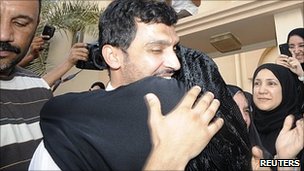 Matar Matar on release from prison, August 2011 (Photo: Reuters)Two weeks ago at Boston College, I met Matar Ebrahim Matar who describes himself as "the youngest Ex-MP representing the largest constituency in Bahrain. Detained for 3 months for defending the legitimate demands of ppl of Bahrain. Now free!"
Matar Matar on release from prison, August 2011 (Photo: Reuters)Two weeks ago at Boston College, I met Matar Ebrahim Matar who describes himself as "the youngest Ex-MP representing the largest constituency in Bahrain. Detained for 3 months for defending the legitimate demands of ppl of Bahrain. Now free!"
Matar was traveling with Bahraini journalist Nada Alwadi in an attempt to raise awareness of the plight of the Bahraini opposition. The presentation was timely --- both spoke of a rapidly decaying situation over the last several months.
Since we posted a timeline of recent events, there have been more clashes, more arrests, and more deaths. For the first time, police blocked civilians from attending a Friday prayer ceremony led by Sheikh Isa Qasim, attacking with teargas and birdshot anyone who tried to reach the Duraz mosque. As 16-year-old Ali Abbas Radhi ran from the police, he was struck by a car and was killed.
Matar sent the following responses to my questions over the weekend:
James Miller: Why do you think we are seeing an intensification in violence now?
Matar Ebrahim Matar: Let me talk about the last 3 to 4 months:
Regarding the violence from security forces...
- Excessive force: The victims of tear gas have been reduced but the severe injuries from [birdshot shotgun pellets] have increased.
- Beating protesters without arrest was reducing [the inference being that the number is again on the rise].
- Regarding torture, the [lawyers of political prisoners] are raising more claims about torture...
- Regarding destroying private property, it is also coming back during [recent months], and security is raiding houses again.
- The most important indicator is the murder. Husam [al-Haddad, a 16 year old killed by police in August] and Ali [Hussain Neama, a 17 year old killed by birdshot in September] were targeted from short distances [and shot] in their backs. The cases represent a growth in intentional killing [on the part of police].
Recently one detainee [Mohammed Mushaima] died because [the authorities ignored] all calls by his lawyer for his release because his health problems with Sickle cell anemia [were growing worse]. Also, two expats died together after a police car ran over them, which is very strange accident. These case give indicators of where things are going under the impunity culture.
Regarding the violence from the protesters. I think the clashes are taking a new phase, which is more dangerous. That's why there are cases of deaths among the riot police. However, [there are] no signs of a major increase in the scale of violence in term of numbers of violent protesters, number of incidents, or techniques used.
By the way, all the violence has already existed for a long time (8 months). Until now, no major players believed in violence or have given excuses for it. And there are no signs that any major player in the pro-democracy movement will change their mind about this issue. The possibility is that there will be a reduction in the popularity of the main players, but Isa Qasim, AlWefaq and others are getting more popular after the recent escalation against them by the regime. But of course an escalation can happen at any time and it is difficult for any one to expect it.
The real threat for stability is coming a source which doesn't get enough attention. It is from the radicals who are supported by the regime. They are armed because they are serving in the military and security forces and they have big space because of the culture of impunity. They are getting more power and I doubt the government can control them all the way. When I was in prison I noticed the divisions inside each unit.
The US government is trying to avoid talking in public about this issue but I'm not sure if they are really monitoring the space given to these [radical pro-regime] powers.
JM: Is the government any closer to real reform? Is the King any closer to a political solution with AlWefaq or any other group?
MEM:- No at all. The policy of the king is not just to control things by force. It is beyond this. It is a policy of revenge, persecution and genocide. Such polices will have a more regional impact.
JM: What can the opposition, especially AlWefaq, do to calm this situation?
MEM: We are just victims of this revenge policy. And it is very far fetched to expect the King will think about compromises if he has the space to maintain the power. The solution will never come from inside: it should be forced from outside after agreement by the regional powers, including the US. And the solution can start if all outsiders push for a new Prime Minister.
In general: It is clear that the regime is going beyond the ban of rallies and demonstrations. The Government of Bahrain will utilize whatever space they have to the maximum. As in Syria, it is difficult to see an internal solution. In Bahrain, there are no signs of change without forcing the regime to compromise based on a solution agreed on by the regional and international powers.